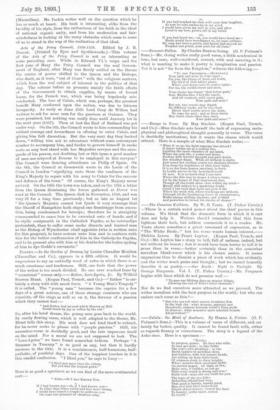Acts of the Privy Council, 15564558. Edited by J. R.
Dasent. (Printed by Eyre and Spottiswoode.)—This volume of the Acts of the Privy Council is not as interesting as some preceding ones. While in Edward VI.'s reign and the first year of Mary the Privy Council was the real Govern- ment of England, after Mary was firmly settled on the throne the centre of power shifted to the Queen and the Bishops, who dealt, as it were, "out of Court" with the religious matters, which form the real subject of interest in the politics of that day. The volume before us presents mainly the futile efforts of the Government to obtain supplies, by means of forced loans, for the French war, which was being hopelessly mis- conducted. The loss of Calais, which was, perhaps, the greatest benefit Mary conferred upon the nation, was due to fatuous incapacity. As early as June 25th Lord Grey de Wilton had written to ask for more men for the garrison at Guisnes. They -were promised, but nothing was really done until January 1st in the next year (1557). Then at last the Earl of Rutland was got .under way. On the 5th, the Council wrote to him commending his valiant courage and towardness in offering to enter Calais, and giving him full discretion. But the very next day they backed Clown, "willing him not to adventure without some convenyent nomber to accompany him, and furder to govern himself in suche sorte as may best stand with her Majesties servyce and the save- garde of his person, not doubting but or this tyme a good nomber of men are arryved at Devour to be employed in this servyce." The Council were dancing attendance on Philip of Spain. On the 8th, the Council at Greenwich wrote to the Lords of the Council in London " signifying unto them the readiness of the King's Majesty to repair with his army to Calais for the succour and defence of the town." Of course, the King's Majesty never arrived. On the 10th the town was taken, and on the 13th a letter from the Queen dismissing the forces gathered at Dover was read at the Council. The Queen died in November, 1558, and was very ill for a long time previously ; but as late as. August 1st " the Quene's Majestie cannot but fynde it very straunge that the Sheriff of Hampshire bath stayed one Bembrigge from execu- tion, being condemmed for heresye; therefore he is straightly commaunded to cause him to be executed oute of hands, and if he style contynueth in the Catholick Faythe, as he outwardly° pretendeth, than to suffer some suohe discrete and learned man as the Bishop of Wynchester shall appoints (who is written unto for this purpose), to have access° unto him and to conferre with him for the better conflrmacion of him in the Catholycke Faythe, and to be present also with him at his deathe for the better ayding of him to dye Godde's servaunte."


































 Previous page
Previous page